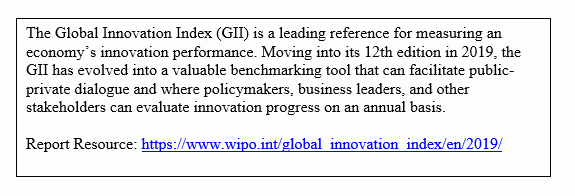 As a report, the 2019 Global Innovation Index (GII) is a whopper, at 450 pages, although 50% of this is detailed economic profiles and data tables for each country within the index.
As a report, the 2019 Global Innovation Index (GII) is a whopper, at 450 pages, although 50% of this is detailed economic profiles and data tables for each country within the index.
This GII report investigates and reports on 129 countries and then analyzes and ranks them accordingly.
When you are caught up in generating innovation within a business these sorts of reports can often pass you by as not so relevant to your everyday job of innovation.
I can certainly understand that but as a barometer of the health and investment going into innovation, it will eventually filter through to you and has more relevance than you first imagine.
 This report is mainly for those interested in forming national policy on innovation, or judging where they are within the global race on innovation, yet it tells us all some really important points on the current health of innovation.
This report is mainly for those interested in forming national policy on innovation, or judging where they are within the global race on innovation, yet it tells us all some really important points on the current health of innovation.
Yet the innovation message is for us all. If nothing else read this summary. Continue reading “Checking for the global pulse of innovation”

